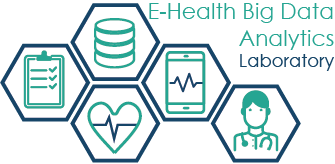The eHealth Big Data Analytics (eHBDA) laboratory was established as part of the ICT for Health project, funded by the Departments of Excellence program of the Ministry of Education, University and Research. The laboratory has acquired a public-private cloud infrastructure to support research, mainly along two lines of the ICT for Heath project: "Data for Health" and "Logistics for Health".
The eHealth Analytics laboratory is based on Big Data technologies for the design and prototyping of architectural and algorithmic solutions for the management and analysis of eHealth data. The 4.0 hospital is conceived as the place where processes aimed at "producing value" are implemented, integrating technology and processes for production and delivery of health, clinical or surgical services. Furthermore, it represents the place where different instruments and devices (from sensors to medical devices, from more or less complex devices linked to diagnostics equipment in the operating room, up to the ward and to the patient's bedside) are interconnected in an ecosystem in which they send parameters that can feed the wealth of clinical information of each patient in real time, informing people about their state of health, helping to raise the expectation of a healthy life from a physical and mental point of view.
Starting from this point of view, the architectural layout and design of an information management system infrastructure must necessarily take into account new paradigms and new models that allow managing complexity, volume, heterogeneity and data speed. This requires the need to investigate solutions based on the Internet of Things paradigm, for the interconnection and acquisition of data from different ecosystem devices, and the analysis of new processing paradigms, in particular cloud-based. The solution proposed in this laboratory is cloud-based. Given the amount of data, the infrastructure proposed is based on the Hadoop and Spark ecosystems, taking into consideration new information management systems that integrate relational (SQL), non-relational (NoSQL) architectures, and new relational (newSQL). On these architectures, specific environments are used for the development and integration of descriptive, diagnostic, predictive, and prescriptive analysis techniques as well as Data Mining tools and techniques on Massive Data Sets, which also include systems based on Deep Learning.
The laboratory operates two types of infrastructures:
- Public cloud infrastructure, based on the services of Amazon Web Services (AWS) and managed by TIM SPA, which involves the acquisition of AWS Cloud resources for 3 years. The resources are divided among nodes for data collection, storage, processing, and for the use of results with Business Intelligence techniques.
- Private cloud infrastructure being acquired and installed at the San Giovanni a Teduccio Campus. The resources are divided between nodes for data collection, storage, processing, and for the use of results with Business Intelligence techniques.
The details on the infrastructures are on the relevant pages:





